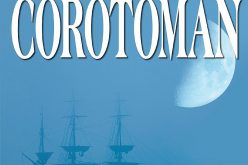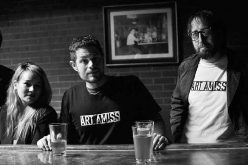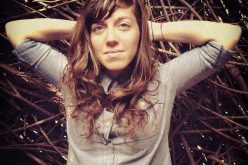Where Dreams Come True
A Look at the Real-Life Magic Behind Terra Studios
By Blair Jackson
 Nestled in the Ozark Mountains, 20 minutes from the Fayetteville city limits, is Terra Studios. Here, winter is the quiet season. A few flowers are beginning to push through the soil. Jamie Ulick walks the grounds, picking up pieces of plaster that have been damaged throughout the winter months.
Nestled in the Ozark Mountains, 20 minutes from the Fayetteville city limits, is Terra Studios. Here, winter is the quiet season. A few flowers are beginning to push through the soil. Jamie Ulick walks the grounds, picking up pieces of plaster that have been damaged throughout the winter months.
A stone from the labyrinth has tipped over. The tile from one of the installation murals has slipped. Many of the outdoor sculptures of Terra were created in an experimental fashion, 30 years ago, with little knowledge of how the materials would withstand the harsh winter weather. The outdoor sculptures have fared relatively well over the years, though a few were lost in the ice storm of 2009.
“Upkeep is a constant thing,” says Ulick, who purchased Terra Studios five years ago. The 10-acre complex currently includes a gallery, a cafe, apartments and rental homes, a pottery workshop, an events center, a mural garden, a sculpture garden, two gazebos, a labyrinth, a gallery and salesroom, as well as an observation area where visitors can watch the resident glassblowers work — most of which have been developed under Ulick’s ownership.
And Terra is still growing.
In the mural garden, Ulick describes an upcoming installation: a series of painted tiles created on-site by veterans. A trench on the edge of Fountain Lake is the future home of a troll village. (The trolls currently live in “The Troll Hole,” which is also the public restroom.)
On the side of the apartment buildings, an enormous chain installation is to be erected. The chains will simulate Spanish architect Antoni Gaudi’s three-dimensional planning techniques. The architect used chains and hanging models to design structures such as cathedral arches. Visitors will be encouraged to interact with the installation to understand Gaudi’s process.
The influence of Antoni Gaudi can be seen elsewhere in Terra Studios: colorful mosaics of ceramic and glass; textures, curves and patterns that seem born of a child’s mind. Like Gaudi, the creators of Terra Studios, Rita and Leo Ward, created structures and art that convey a sense of childlike fantasy and wonder.
Rita, who was an elementary school teacher and children’s author, created a variety of sculptures based on characters in her books. Trolls, gnomes and creatures are tucked in various corners of the property — in a tiny house built into a garden wall, under a bridge, or in the garden.
Interaction is a key component of the Terra experience. The sculptures can be touched and can become characters during a child’s playtime. Over the years, with help from other artists, the Wards created a wonderland in sculptures and architecture.
Today, almost 30 years later, Ulick and his partner Val Gonzalez uphold Terra’s commitment

Staff Photo by Blair Jackson: Jamie Ulick and Val Gonzalez, the couple behind Terra Studios, are committed to their motto of "using art to create a better world."
to children and their imaginations. “They are the future,” says Ulick. During the warmer months, the couple participates in First Thursday on the downtown Fayetteville square, teaching arts and crafts.
A box of completed crafts sits on a shelf in one of the workshops. Ulick pulls out a paper-and-string mobile that a child created during First Thursday. He says they often offer the projects for free and that they charge, at the most, for the cost of supplies. “Money shouldn’t be a limitation,” he says.
Ulick and Gonzalez believe that when a learning environment does not include art, children lose valuable creative outlets. Though the art park is free, they say many schools cannot afford the transportation.
At Terra, children are not the only ones encouraged to play. In a grassy patch on the edge of Fountain Lake are two different patterns of tile that have been laid for hopscotch. One is small, for the feet of children. The other set is made from larger tiles, for the feet of adults. The park is designed for adults and children to interact together, as well as with the environment.
This active approach to art is also integrated into workshops and classes for both children and adults. The classes are simple, offering learners the opportunity to gain a basic understanding of a method. “People can come, do and learn. They can keep taking classes to get better,” says Ulick. The end goal, however, is not to teach people to reach a professional level.
“Being creative and having fun,” is what Ulick says the classes are all about.
“Terra teaches people that they can be creative. They can make something out of a piece of clay. You can see something in your own way and manifest it. It’s an experiential thing. Learning through art, people get the feeling they can do anything,” says Ulick. “It’s fun to watch people open up and get excited.”
Running parallel to the instruction of each new technique is a metaphor or life lesson. This transforms a simple art class into a thought-provoking, interactive session between social concepts, imagination and creativity.
Gonzalez explains the wire wrapping class in which each student is given a piece of blue “happiness” glass, the same material from which Terra’s famous “bluebirds of happiness” are made.
“If you look, each one is wrapped differently,” she says, referencing the different pieces of “happiness” glass that lie on the table. Gold-colored wire wraps the sides of one piece. Another piece is bound across the center. “You choose how to wrap it. There are several different ways to do it, but it must secure the happiness glass.” If the glass is not secured properly, the glass will slip through the wire, and could potentially shatter. Gonzalez says this is a working example of how good life choices secure happiness within life.
In addition to art classes, Terra Studios integrates creativity into the community by offering leadership classes. Gonzalez, who has a background in education and communication, leads these workshops. Using art projects, she teaches conflict resolution and other techniques for difficult social situations. In the future, Terra Studios will offer an education program designed for teen and young adults that will teach life skills that are not included in the current curriculum, such as financial literacy, time management and what to expect when purchasing a car.
“You know, ‘real life,’” says Gonzalez, “all the really important stuff they didn’t teach you in school and our parents didn’t necessarily get around to — the stuff those of us who are a little older wish someone in our lives had at least mentioned.”
The extended program will include an entrepreneurial series as well, based on the Kauffman Foundation’s “Who Owns the Ice House?” program.
For Ulick, creativity and entrepreneurship are intertwined, which makes an entrepreneurial class a perfect fit for Terra Studios.
Ulick explains that novel ideas come with a “eureka moment,” where the thinker stepped outside the norm and saw the problem or opportunity from a different angle. “The entrepreneur has eyes that are wide open,” he says. “Entrepreneurship is about having the ability to problem solve, to see opportunity and think creatively, to think outside the box.”
“Creativity is what’s given America its edge for the past 100 years. For the entrepreneurial spirit, it’s so critically important. You can’t solve a problem with the same way of thinking that got you there.”
Ulick says it’s important to be able to collaborate with different opinions. “There are a million ways of thinking and a million ways of being,” he says. Gonzalez, who specialized in diversity and intercultural communication, has worked across the nation assisting businesses and communities with diversity conflicts. The idea behind Terra’s leadership program is to promote a collaborative effort between people with different mindsets and, Ulick adds, “to get people to think creatively in everything they do.” This concept applies to the infrastructure of the Terra Studio’s business model, and its motto, “using art to create a better world.”
Terra Studios is managed in a unique style called “dream management.” Ulick says the goal of dream management is to promote “a culture where people start thinking and talking about dreams and supporting each other’s dreams.” Ulick says this gives his employees the opportunity to create and manage their own processes and empowers them to achieve their goals. Ulick also encourages local artists to sell their merchandise in the Muse Gallery.
Ulick, who retired from a successful career in the gift industry, understands the difficulties of launching a new product, and seeks to create an environment that allows artists and craftsmen to market test and to find their niche in the industry. The gallery and salesroom allow artists to receive feedback from the Terra retail team, providing services to both artists and consumers by gathering feedback and pinpointing key attributes of best-selling items such as color and style.
The impact of Terra Studios reaches outside of the arts community, supporting two of society’s most vulnerable demographics: children and the elderly. The business holds two annual music festivals to support Meals on Wheels, and it also holds a kid’s day retreat that supports seven different children’s charities. Three years ago, they began making pink glass birds to support the Susan G. Komen foundation.
As for being a company that makes generous donations, Ulick says, “Money is overrated.”
“There is a part of making money that is essential,” adds Gonzalez, “and there is a part that goes to greed.” Terra Studios is free to the public.
“We choose our lives. We choose our community. You can choose cooperative or competitive ways. You can choose to be stagnant or creative,” says Ulick. “By doing something wonderful in the community, it comes back.”





